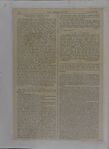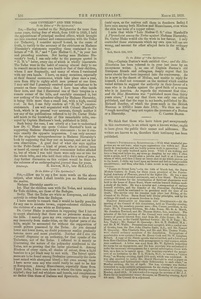 |
vol. title: Vol Four of The Theosophical Society of The Arya Samaj of Arya-wart vol. period: Sept 1878 – Sept 1879 pages in vol.: 350 |
"Isis Unveiled" and the Todas
Sir,— Having resided on the Neilgherries for more than seven years, during four of which, from 1830 to 1835, I held the appointment of principal medical officer, which brought me into constant contact and communication with the Todas (or Todaows), I consider myself bound, in the cause of truth, to testify to the accuracy of the strictures on Madame Blavatsky’s statements regarding them contained in the letters of “H. M.,” and “Late Madras C. S.,” in your last and preceding numbers. Hot having seen Madame Blavatsky’s book, I can only refer to the passages quoted in “H. M.’s” letter, every one of which is wholly inaccurate. The Todas were in the habit of coming almost daily to me to consult me as to their own health or that of their children, whom I saw frequently, and many of whom I vaccinated with my own hands. I have, on many occasions, especially at their funeral ceremonies, which take place once a year, seen from fifty to eighty adult men present at one time. I may add that I generally received special invitations to be present on these occasions; that I have been often inside their huts, and that I discovered one of their temples in a remote corner of the hills, and carefully examined it, but saw nothing of the splendour alleged by Madame Blavatsky, it being little more than a small hut, with a high, conical roof. In fact, I can fully confirm all “H. M.’s” counter- statements. I am well acquainted with Colonel Marshall’s book, which is in general very accurate, though neither it nor any of the publications referred to by Dr. Carter Blake add much to the knowledge of this remarkable tribe, conveyed by Captain Harkness’s book, published in 1832.
Such being the case, I am utterly at a loss to understand how Dr. C. Blake can quote Colonel Marshall’s book as supporting Madame Blavatsky’s statements: to me it conveys exactly the opposite impression. I can only account for the singular misapprehensions in Madame Blavatsky’s book by supposing that they rest on hearsay, and not on her own observation. A good deal of what she says applies to the Peiki-Tarali—a kind of priest, who is seldom seen or heard of, except at the funeral ceremonies before alluded to, but of whom I was told there were only one or two for the whole tribe, and who hold their office for a term of years. Any further discussion on this subject would be fitter for the columns of an anthropological journal than for yours.
Edinburgh.
<Untitled> (Sir,-—Allow me to say...)
Sir,—Allow me to say a few more words on the above subject, after which I shall trouble you no further about the matter.
Madame Blavatsky asserts:—
1st. That the children seen with the Todas, and mistaken for Toda children, are those of the Badegas.
2ndly. That the Todas are white as Europeans, and differ entirely in colour from the Badegas.
I have merely to remark that it would be hardly possiblefor any one to mistake brown, copper-coloured children for the children of a race white as Europeans.
Dr. Carter Blake is mistaken in supposing that I intend to assert absolutely that there are no poisonous snakes on the hills. I merely gave my own experience to show that any immunity from snake-bites, on the highest parts of the hills, might be accounted for without the supposition of occult powers possessed by the Todas. As you descend lower and lower down, no doubt poisonous snakes gradually become; more and more plentiful. Neither did I cite the Cornhill Magazine as an authority, for that speaks of the Thibetans, not of the Todas. I referred to it merely as illustrating the nature of the polyandry attributed to the Todas, not as proving that the latter practised it. Among Hindoos of every caste, all shades of colour, from a light bamboo to a jet black may be met with. The fairest specimens are to be found among Brahmins (presumably the caste least mixed with aboriginal blood); but even among these I have never seen any who could really be said to be fair as Europeans. Among Mussulmans, especially those from Upper India, I have seen those to whom the term might be applied; they had red whiskers and beards, and complexions no darker than those of Italians and Spaniards. Grey eyes (cats’-eyes, as the natives call them in Southern India) I have seen among both Hindoos and Mussulmans, even when the skin has been of a copper colour.
I note that while “Late Madras C. S.” cites Marshall’s A Phrenologist among the Todas against Madame Blavatsky, Dr. Carter Blake would cite the work in her favour. I only contradict those statements which my own eyes tell me are wrong, and account for other alleged facts in the ordinary way.
Bath, March 15th, 1878.
<Untitled> (Sir,—Captain Burton’s...)
Sir,—Captain Burton’s work entitled Goa; and the Blue Mountains has been referred to in your last issue by an anonymous writer. I, as one of Captain Burton’s old European friends and colleagues, deeply regret that his name should have been imported into the controversy. As he is now in the desert of Midian, and unable to reply for himself, I shall not comment on the method which enables veiled writers to suggest the authority in their favour of a man who is in Arabia against the good faith of a woman who is in America. As regards the statement that Goa; and the Blue Mountains was “published more than thirty years since,” I may say that there was only one edition published, and that the copy in my hands, published by Mr. Richard Bentley, of which the press mark in the British Museum is 10055 c bears date 1851. We thus see that “rough unveiling” may not require the presence of a Burton or a Blavatsky.
<Untitled> (We think that those...)
We think that those who have taken part anonymously in this controversy, in an attack upon a known writer, ought to have given the public their names and addresses. The writers are known to us, therefore their testimony has been published.
<Untitled> (Goethe's Psychological Sensitiveness...)
Goethe’s Psychological Sensitiveness.— With what wonderful properties are we not born; what vague aspirations rise within us! How rarely do imagination and our bodily powers work in opposition! Peculiarities of my early boyhood again recur. While I am walking, and have a long road before me, my arms go dangling by my side; I often make a grasp, as if I would seize a javelin and hurl it at I know not whom or what, and then I fancy an arrow shot at me which pierces me to the heart; I strike my hand upon my breast and feel an inexpressible sensitiveness; and then, after this, I soon revert to my natural state.— Goethe.
“Passed to Spirit Life.”— On the 14th of March last, the Baron Michele Guitera de Bozzi, for three years president of the Psychological Academy of Florence, passed to the higher life. He was a man of noble mind and elevated sentiments, and a true friend. The leading seances in Florence for the investigation of Spiritual phenomena were held in the house of Baron Bozzi, where various learned Italians made a study of the facts. He was a member and correspondent of various learned societies, and the founder of the Florentine Psychological Society, of which he continued to be president until the time of his death. The service over his remains took place last Friday, at the Church of St. Felice. Baron Bozzi held liberal principles, and by his writings did much to promote freedom in Italy.
Dalston Association of Inquirers into Spiritualism.—At the meeting of the Council of this Association, held on Thursday evening, March 14th, the members present were—Mrs. Corner, president, in the chair; Mr. R. Pomeroy-Tredwen, Mr. John Rouse, Mr. R. A. March, Mr. Jonathan Toseland, and Mr. Thomas Blyton, hon. secretary. The minutes of the last meeting of the Council were read and confirmed. Letters of general interest were read from Mr. John Rouse; Mr. A. I. Smart, hon. sec. to the Cardiff Spiritual Society; Mr. G. R. Tapp; Mr. Leo. Tucker; Mr. Samuel H. Quarmfiy; Rev. G. T. Driffield, M.A.; and Mr. E. W. Wallis. Presentations were accepted, with a cordial vote of thanks, from the Rev. John Charles Earle, B.A., and Mr. Samuel H. Quarmby. Mrs. Charlotte Rice, and Mr. and Mrs. Thomas Weeks, were elected ordinary members of the Association. Resignations of membership were accepted from Mr. Henry Cook and Mr. W. Langham Millard. A copy of the March agenda was submitted, and a letter read from Herr Christian Reimers, with arrangements to read a paper, which were confirmed. A letter was read from Mr. W. Eglinton respecting his terms for an engagement, and the hon. secretary was authorised to make the necessary arrangements for a special subscription seance with him, on a date to be agreed upon. The secretary reported the acceptance of an invitation by Mr. T. L. Nichols, M.D., to narrate a “Ghost Story,” on Monday evening, April 15th next, which was confirmed. It was also resolved to invite Mr. Morell Theobald to read a paper on “Christianity and Spiritualism—their Relationship to each other,” on Monday evening, the 1st of April. The hon. secretary was further instructed to make suitable arrangements for the closing of the present winter’s series of fortnightly Monday evening discussion meetings, on Monday, April 29th; It was resolved to engage the services of Mr. J. J. Morse for an inspirational trance discourse, on Thursday evening, April 4th next. The Council then adjourned.
Editor's notes
- ↑ "Isis Unveiled" and the Todas by Baikie, R., London Spiritualist, No. 291, March 22, 1878, p. 136
- ↑ Sir,-—Allow me to say... by H.M., London Spiritualist, No. 291, March 22, 1878, p. 136
- ↑ Sir,—Captain Burton’s... by Blake, Carter C., London Spiritualist, No. 291, March 22, 1878, p. 136
- ↑ We think that those... by unknown author, London Spiritualist, No. 291, March 22, 1878, p. 136
- ↑ Goethe's Psychological Sensitiveness... by unknown author, London Spiritualist, No. 291, March 22, 1878, p. 136
Sources
-
London Spiritualist, No. 291, March 22, 1878, p. 136

